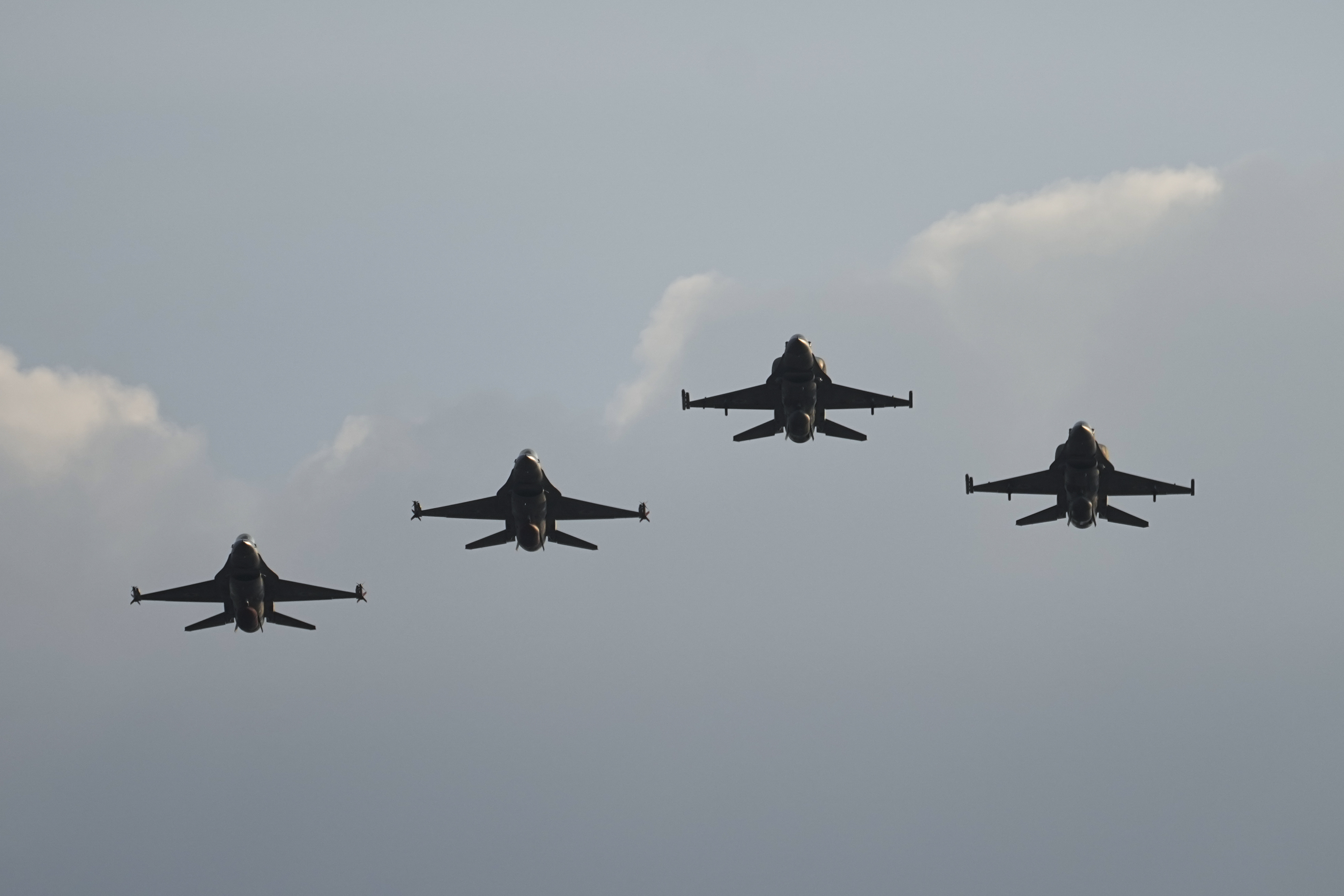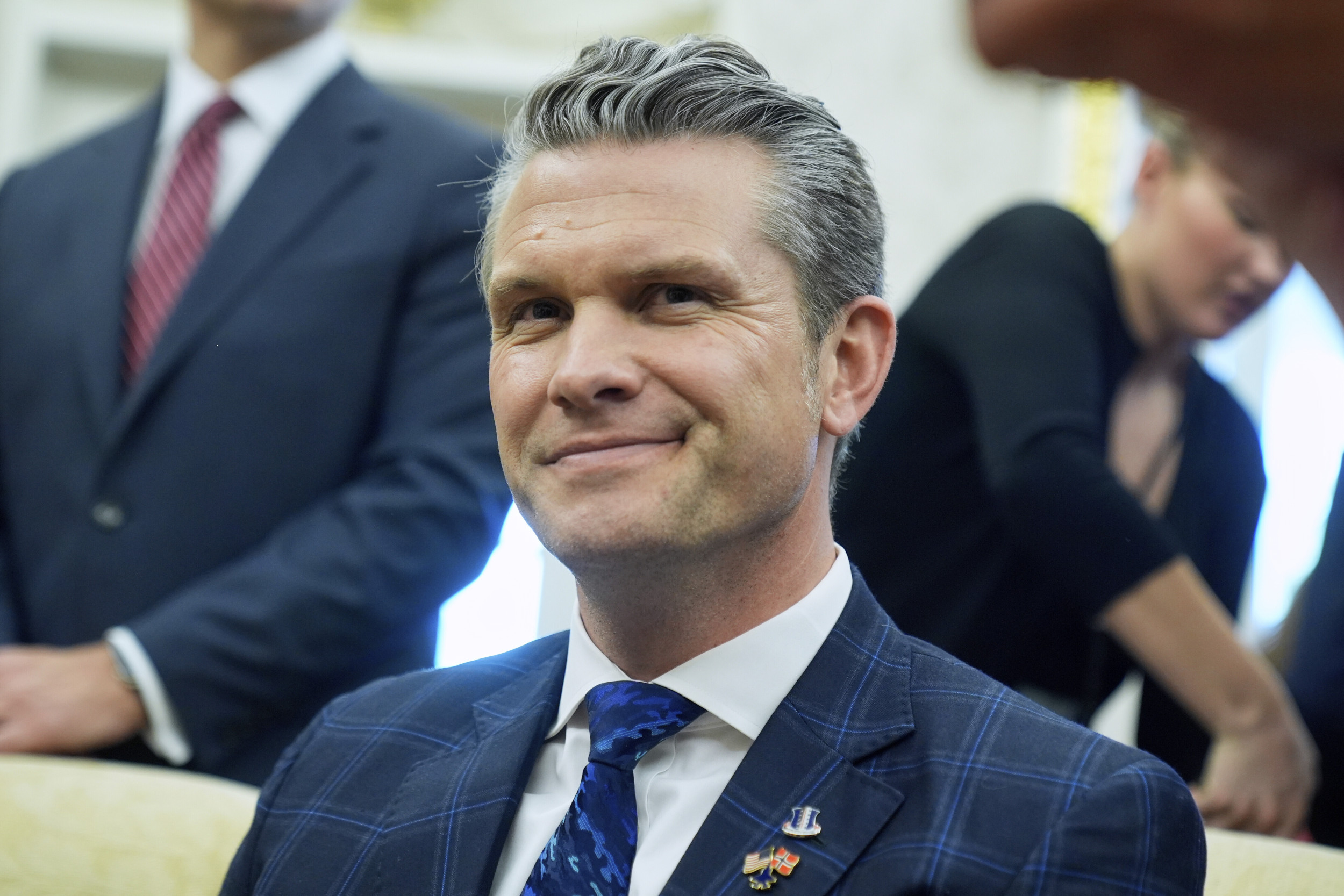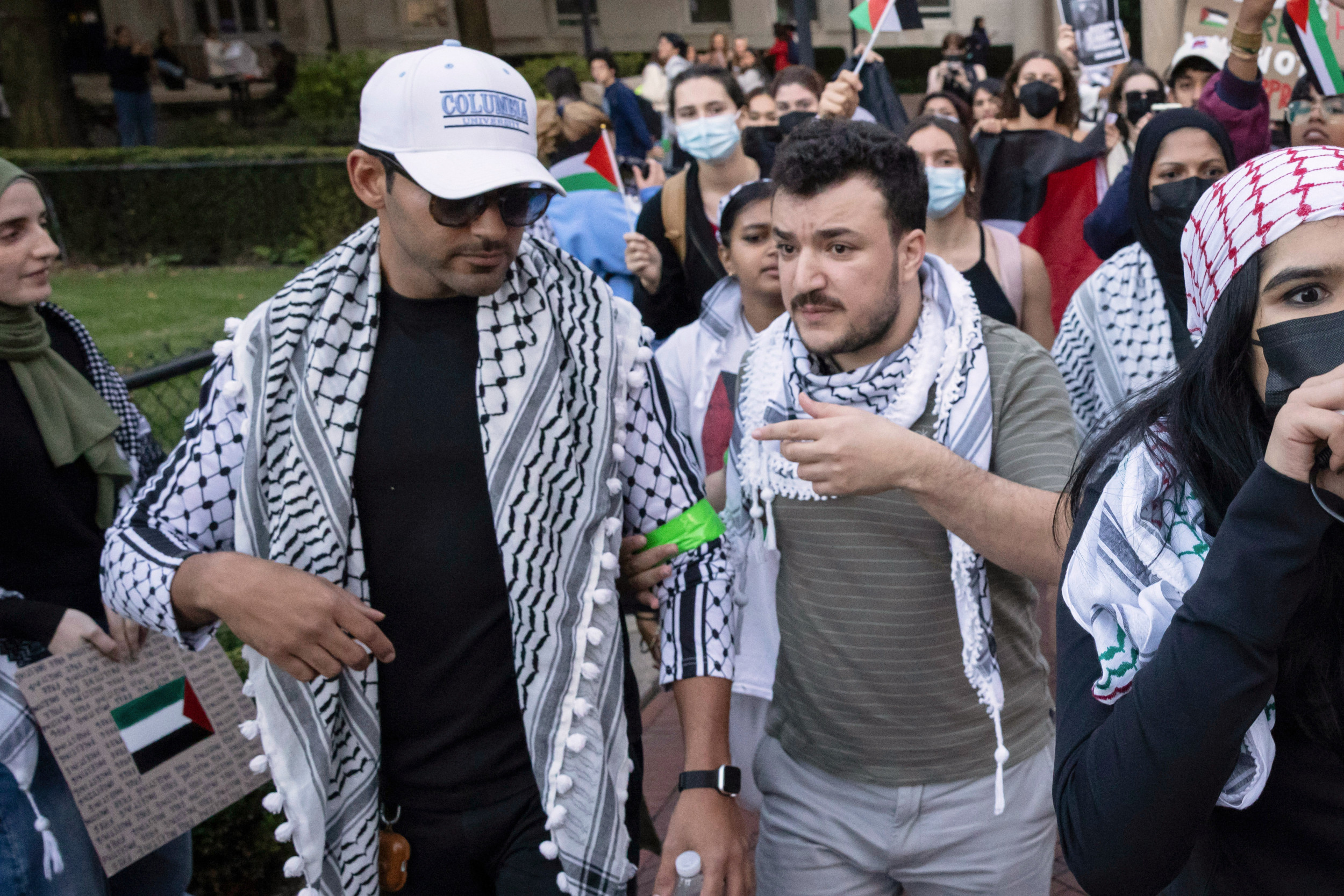🎙️ Voice is AI-generated. Inconsistencies may occur.
The overthrow of Syrian President Bashar al-Assad may have marked a major blow to the Iran-aligned Axis of Resistance coalition, but a new group styling itself in a similar manner has emerged to challenge the interests of the United States and its feuding top Middle Eastern allies.
With post-Assad Syria now at the center of a regional struggle for influence between neighboring Israel and Turkey, the militia known as Uli al-Baas, or "the Possessors of Might," argues it is "positioned with the Axis of Resistance against the Axis of Global Evil," of which Washington is said to be a part due to President Donald Trump's support for both foreign powers.
"As for praising the role of the Zionist entity and the Turkish occupation, this is only natural, given that [the U.S.] is the sponsor of chaos, terrorism and evil around the world," the political office of the group officially known as the "Islamic Resistance Front in Syria - Uli al-Baas," told Newsweek.
But the group emphasizes that it distinguishes between the U.S. government and its people. As such, asked for a message to send to the president, as a number of other Axis of Resistance factions have shared with Newsweek in the past, Uli al-Baas declined, citing a gap between the White House and its constituency.
"We believe that successive American administrations do not represent the American people and do not reflect the character of sound coexistence with diverse peoples that the American people enjoy," Uli al-Baas said.
"Therefore," the group added, "we do not address a message to those who do not represent their people but rather represent the dreams of a global government that is trying to dissolve humanity in order to achieve great gains around the world."

The Origins of Uli al-Baas
Uli al-Baas remains largely shrouded in mystery since emerging to a volatile scene in Syria in January, just weeks after Assad's quarter-century rule came to an end at the hands of an Islamist-led coalition of rebels on December 9. In its first communiqué, the group announced an armed campaign against Israeli troops seizing further territory in southern Syria beyond the already occupied Golan Heights.
Many observers, such as those at the Washington Institute for Near East Policy and Israel's Alma Research and Education Center, have speculated that the group has its origins in an effort by Iran to maintain influence in a country long considered the Islamic Republic's top Arab ally under the Assad dynasty.
Damascus and Tehran's strategic partnership dates back decades and Syria served as key member of the Axis of Resistance coalition established in the 2000s in response to the "Axis of Evil" label that former President George W. Bush applied to Iran, Iraq and North Korea, later expanded to include Cuba, Libya and Syria by then-Undersecretary of State John Bolton. U.S.-Syria ties deteriorated after the outbreak of the country's civil war in 2011, with the U.S. sponsoring various insurgent groups before shifting its support to the Kurdish-led Syrian Democratic Forces (SDF).
As the SDF waged a separate campaign against the Islamic State militant group (ISIS), Assad, backed by Iran and Russia, regained much of the territory lost to rebels and jihadis. By 2019, with ISIS largely defeated, the conflict fell into a virtual stalemate until the shock offensive led by insurgent groups such as Hayat Tahrir al-Sham (HTS) and the Turkey-backed Syrian National Army.
Some groups that fought alongside the former government, such as the Syrian Socialist National Party (SSNP), have remained active in the field, largely framing their operations as a response to Israel's expanded occupation.
The SSNP, which officially advocates for a "Greater Syria" encompassing large parts of the Levant and its periphery, including Israel, called on December 17 for "the establishment of a Syrian front to stand up against the blatant aggression" of invading Israeli forces. On January 9, Uli al-Baas appeared to heed the call, debuting under the title of the "Southern Liberation Front" before rebranding itself on January 11 to its current name and image.
The imagery used by Uli al-Baas, particularly the raised Kalashnikov-style rifle, matches a signature pattern established by Iran's Islamic Revolutionary Guard Corps and later incorporated into the logos of Lebanon's Hezbollah, officially known as the Islamic Resistance in Lebanon, and other Axis of Resistance allies, such as the various militias that make up the Islamic Resistance in Iraq.
The term "Uli al-Baas," which appears several times in the Quran, was also used by Hezbollah Secretary-General Naim Qassem to describe the group's confrontation with Israel after the assassination of his predecessor, Hassan Nasrallah. Hezbollah was one of several Axis of Resistance factions to intervene on behalf of the Palestinian Hamas movement after its October 7, 2023, attack against Israel that sparked the still-ongoing war in the Gaza Strip.
But while acknowledging its participation in the Axis of Resistance, Uli al-Baas maintains that it is "not affiliated with any regional party or any country," nor does it claim links to any other groups present in Syria.
"The Islamic Resistance Front in Syria, Uli al-Baas, is a faith-based, revolutionary, nationalist movement with an Arab nationalist dimension, unaffiliated with any existing organization in Syria," the group said. "It has its own political project of resistance that guarantees the establishment of a strong, capable, and freedom-supporting state."
Its objective is to "lead a state-building process based on citizenship, steadfastness on the land, and true affiliation." It does not view restoring Assad, who fled to Russia as rebels descended on Damascus in December, to power "as politically realistic," but it also does not endorse his successor, HTS leader-turned-Syrian Interim President Ahmed al-Sharaa, formerly known as Abu Mohammed al-Golani.
"We cannot support individuals," Uli al-Baas, which continues to promote the Syrian flag used under Assad, said. "We believe that the Syrian people are the decision-makers."
Newsweek has reached out to the Syrian Ministry of Information for comment.
A 50-Year Front Reignited
Uli al-Baas does, however, view expelling Israeli forces in southern Syria as part of its mandate. The incursion marked the first time Israel had significantly moved past the armistice line established during the last war between the two in 1973. The land grab was accompanied by some of Israel's largest scale strikes against sites said to be affiliated with the military of the former Syrian government, including alleged chemical weapons depots.
Now, as the Israeli air campaign continues and the Israel Defense Forces (IDF) signals no intent to leave its expanded area of control in Syria, Uli al-Baas said that "it also our duty, as a representative of a segment of the population, to be in a position to defeat the occupation."
Uli al-Baas appeared to enforce this claim last month, taking responsibility for a series of clashes with Israeli troops in the southern province of Daraa.
One Israeli defense official, speaking on background, acknowledged "a few incidents in southern Syria lately, tactical but interesting incidents of clashes with our forces."
"We are very adamant to make sure that no force that is a dangerous force, that can endanger our civilians, is on our doorstep, that is a running distance from our communities," the Israeli military official told Newsweek. "We have seen some of the things that happened in Syria in recent weeks even, and we have to stay vigilant on our border and make sure we are there to defend our people, make sure that there is no threat that is posing on our doors."
Meanwhile, Israeli air raids continue nationwide, most recently striking near the central city of Palmyra on Sunday and a military base in Hama province on Wednesday. The IDF said it "will continue to operate to remove any threat to Israeli civilians," in a statement Wednesday.
Israeli Deputy Consul General in New York Tsach Saar also described Israel's operations in Syria as being rooted in self-defense.
"Israel is not attacking the regime or the people of Syria," Saar told Newsweek. "If there are from time to time operations, it's just to make sure that strategic weapons that are there will not be used against Israel."
Amid public assurances issued by Sharaa that his government posed no threat to Israel, Saar expressed skepticism toward Syria's new leadership given its past ties to jihadi organizations, such as Al-Qaeda and ISIS.
"The regime is new. We're still trying to assess where it's heading. Let's not forget that Al-Golani and his people are, I can say, former jihadists, some people will say, 'Once a jihadist, always a jihadist,' even if he wears a suit. We'll have to see where it's going."
"We have to make sure that our northern border is safe and secure, and we will not compromise on that. At the same time, we don't want to have a war with Syria." Saar added. "So, I think during this time of turmoil in the region, it's important that some very problematic and dangerous capabilities that are left in Syria will be dismantled, and we have to make sure they will not be turned against us one day."
While Sharaa's administration has condemned the Israeli strikes, Uli al-Baas has accused the interim government of being complicit due to its lack of retaliation.
The group issued a statement last month referring to its operations against Israeli troops as affirming both "the revolution of the free Syrian people against the tyranny of the occupation and a clear declaration of rebellion against the de facto government, which is paving the way for this occupier to divide the homeland."

Syria in the Crosshairs
Trump has indicated a lack of interest in entangling his administration in Syria's complex, multisided conflict. But the U.S. continues to maintain around 2,000 troops in the country, largely concentrated alongside the SDF in the northeast as well as in a southern desert garrison alongside the predominantly Arab Syrian Free Army.
For months after the war in Gaza first erupted, U.S. forces faced near-daily attacks by local militias operating under the banner of the Islamic Resistance in Iraq, prompting retaliatory airstrikes. These groups largely paused this campaign after then-President Joe Biden announced a plan to begin withdrawing troops from Iraq by September of this year.
The status of U.S. forces in both Iraq and Syria is now in question under the Trump administration, which has advocated for a reduced military presence in the Middle East and oversaw a historic deal in which the SDF agreed to integrate its autonomous administration into Sharaa's government.
Faced with a new challenger in the emergence of Uli al-Baas, a State Department spokesperson said the U.S. would continue to seek stability and fair governance in Syria and to ensure that designated terrorist organizations would not be able to operate in the country.
"We continue to call for an inclusive, civilian-led government that can ensure national institutions are effective, responsive, and representative," the U.S. State Department spokesperson told Newsweek. "Long-term stability and prosperity for the people of Syria requires a government that protects all Syrians equally."
"Ultimately, the United States wants a Syria that lives in peace with its neighbors, respects human rights, and prohibits terrorists from using its territory as a safe haven," the spokesperson added.
The U.S. continues to consider HTS a terrorist organization despite Sharaa claiming to have rejected jihadi ideologies in recent years and dissolving the group upon taking office in December. The Trump administration has also condemned violence targeting minority groups, including members of Assad's Alawite sect, perpetrated by Syrian security forces and allied militias, who claim to be battling remnants of the former government.
Meanwhile, the U.S. policy in Syria may be further complicated by a recent resurgence of tensions between Washington and Tehran. While the two longtime rivals navigate a potential return to diplomacy in the wake of Trump's decision to abandon a multilateral nuclear accord during his first term in 2018, the U.S. leader has also issued direct threats to Iran over the actions of its allies, particularly Yemen's Ansar Allah, widely known as the Houthi movement.
Uli al-Baas argued that Iran was under pressure because it opposed U.S. attempts to project global influence and Israel's emboldened posture in the region.
"As for the constant threat posed to the Islamic Republic of Iran, this is because it maintains an independent identity and refuses to submit," Uli al-Baas said, "as does Venezuela and other countries that reject American hegemony."
"However," the group said, "the truth is that Iran is threatening the advanced state in West Asia, namely the Zionist entity."
fairness meter
About the writer
Based in his hometown of Staten Island, New York City, Tom O'Connor is an award-winning Senior Writer of Foreign Policy ... Read more




